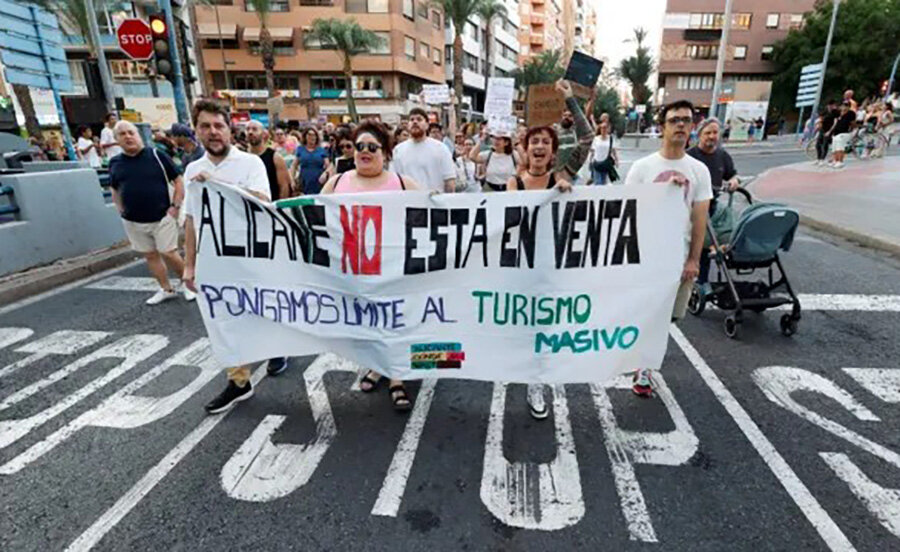Tourism & hospitality / News / Reviews / Real Estate / Spain / Tourism Spain / Real Estate Spain 05.08.2025
Spain Turns Against Tourists: Alicante Joins Anti-Tourism Protest Wave

Photo: The Sun
Mass tourism protests have once again swept across Spain. Cities like Barcelona, Mallorca, San Sebastián, and Granada have seen demonstrations, and now Alicante has joined the movement. On August 2, protesters took to the streets with slogans condemning short-term rentals and the displacement of locals, reports The Sun.
The protest began near Alicante’s oldest bookstore, 80 Mundos, recently sold to a Madrid-based company to be converted into tourist apartments. Demonstrators held English-language signs reading: “We serve your beer but can’t afford rent,” “I’m a neighbor, not an extra in your theme park,” and “This is our home, not your photo backdrop.” One participant wore a shirt that read, “Tourist go home, thank you.”
Protesters argued that tourism no longer brings promised prosperity. “This city is no longer a place we want to live,” said one sign. The main banner read, “Alicante is not for sale.” Organizers said the bookstore’s sale was the breaking point. Spokesman Jordi Arnes criticized the ease with which historical or cultural properties are sold and turned into holiday rentals without public oversight.
This was the third protest by the group “Alicante donde vas,” following earlier ones in July and October 2024. The demonstration ended with a public reading of a manifesto: “The closure of 80 Mundos was the last straw. Tourism increasingly causes more harm than good. The number of visitors grows, while locals struggle to maintain a decent life.”
Mass Actions Across Spain
Other cities saw even larger protests. On June 15, in Palma (Mallorca), 8,000 people (or 30,000, according to organizers) protested. Activists blocked a tourist bus and gathered at Cappuccino Borne café, chanting “As you come, I have to go,” “Go home,” and “The streets will always be ours.” Protesters also used slogans like “No balconing,” referencing the dangerous practice of jumping from balconies into hotel pools.
The day before, protests erupted in Barcelona, Granada, San Sebastián, and Italian cities. This was part of a coordinated pan-European action against overtourism. Balearic Islands Vice President Antoni Costa called the protests “unacceptable,” but public frustration continues to grow. Spaniards blame overtourism for rising rents, the disappearance of local businesses, and infrastructure shifts favoring tourists.
Amid these tensions, Ireland’s Ministry of Foreign Affairs advised tourists traveling to Spain to “be prepared to adjust their plans” due to possible disruptions. Authorities warned of spontaneous demonstrations and urged tourists to avoid large gatherings.
Housing Pressure and Rising Rents
Earlier, on April 5, 2025, Spain saw nationwide demonstrations against the transformation of residential areas into tourist zones. Over 150,000 marched in Madrid alone, chanting “Housing is a right, not a business” and “Our homes are not for tourists.”
This backlash comes amid booming tourism. In 2024, Spain welcomed over 94 million visitors — the second-highest figure globally. In Q1 2025, the country saw 17.1 million arrivals — a 5.7% increase from 2024, according to Idealista.
The housing market remains under pressure. In Barcelona, rent for a two-bedroom flat equals 46% of a family’s income. In Palma, it’s 41%; in Málaga, 40%; Valencia, 39%; Madrid, 38%; Alicante, 37%. Nationally, renters spend 36% of their income on housing, while buyers spend 23%.
Over the past decade, rent has doubled, while property prices rose 44%. Yet incomes lag behind. Since the pandemic, the number of long-term rental homes has halved. Meanwhile, Spain still has a shortfall of around 500,000 homes, with annual construction at just 120,000 units — six times fewer than before the 2008 crisis.
Authorities are introducing new rules to ease pressure and curb foreign speculation. But so far, the impact has been limited.








